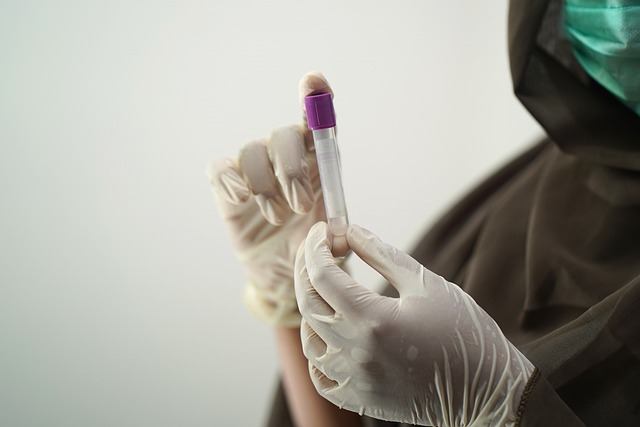The Kidney Blood Test UK is a critical diagnostic tool for monitoring male testosterone levels, which play a significant role in health by influencing sexual characteristics, muscle mass, bone density, and overall well-being. Testosterone levels naturally vary with age and health conditions, making regular testing important for early intervention and personalized healthcare management. This test, part of the routine kidney function tests, is essential for detecting both low and high testosterone levels, which can indicate various health issues. In the UK, the National Health Service (NHS) offers guidelines on normal testosterone ranges to assist healthcare professionals in diagnosing conditions like hypogonadism. A low testosterone count may cause symptoms like fatigue, reduced libido, and mood changes, while high levels can signal potential medical problems. The kidney's role in the test ensures accurate results by filtering substances that might interfere with measurements. The test is integral for identifying hormonal discrepancies affecting male reproductive and metabolic systems and informs treatment strategies tailored to each patient's needs, ensuring comprehensive management of male health concerns where maintaining hormonal balance is crucial. It is advisable for men experiencing relevant symptoms or health issues to consult with a healthcare professional to evaluate the necessity of such testing and to receive proper diagnosis and care.
Men’s health encompasses a broad spectrum of concerns, with testosterone levels playing a pivotal role. This article delves into the significance of testosterone in male health issues and emphasizes the importance of accurate testing, such as the Kidney Blood Test UK, for diagnosis and treatment. We explore how this test is integral to understanding hormonal balance and its impact on well-being, followed by a detailed look at interpreting testosterone results within the UK healthcare context. By demystifying the process, we aim to empower men and healthcare providers with knowledge that can lead to better health outcomes.
- Understanding Testosterone Levels and Their Impact on Men's Health
- The Role of Kidney Blood Test in Testosterone Level Assessment
- Interpreting Testosterone Results and Addressing Male Health Issues Diagnosis in the UK
Understanding Testosterone Levels and Their Impact on Men's Health

Testosterone, often referred to as the primary male hormone, plays a pivotal role in various aspects of men’s health. It is responsible for the development of male characteristics during puberty and is crucial for maintaining muscle mass, bone density, sexual function, and overall well-being throughout a man’s life. Understanding testosterone levels involves recognising that they fluctuate naturally over time due to ageing and other physiological factors. A key component in assessing male health is the measurement of testosterone through a serum testosterone test, which can be performed as part of a kidney blood test. In the UK, this test is readily available and is a valuable tool for healthcare professionals in diagnosing and managing conditions such as hypogonadism, where testosterone levels are deficient. Low testosterone levels can lead to symptoms like fatigue, decreased libido, and mood disturbances, which can significantly impact quality of life. Conversely, excessively high levels may also indicate health issues, necessitating medical evaluation and appropriate intervention. Regular monitoring of testosterone levels, alongside a comprehensive health assessment, is essential for maintaining men’s health and wellness. The kidney blood test UK, which includes the measurement of testosterone, is a non-invasive method that provides insightful data to inform treatment decisions and support overall health management for men.
The Role of Kidney Blood Test in Testosterone Level Assessment

The kidney blood test, a pivotal diagnostic tool for assessing testosterone levels in males, plays a significant role within the UK’s healthcare system. This test is critical for identifying hormonal imbalances that can affect various aspects of men’s health, from reproductive to metabolic functions. It operates by measuring the amount of testosterone present in the bloodstream, which can then inform medical decisions regarding treatment and management of conditions such as hypogonadism or infertility. The kidney, responsible for filtering waste products from the blood, also contributes to the proper functioning of this test by ensuring the sample is clear of unnecessary substances that could interfere with accurate measurement. Patients undergoing a kidney blood test in the UK can expect a comprehensive evaluation of their hormonal health, facilitated by skilled medical professionals and supported by state-of-the-art laboratory infrastructure. This assessment is not limited to diagnosing but also guides ongoing healthcare plans tailored to each individual’s unique physiological needs. It is a fundamental step in the holistic management of male health issues where hormonal balance is paramount, ensuring that men receive the appropriate care for their specific conditions.
Interpreting Testosterone Results and Addressing Male Health Issues Diagnosis in the UK

Interpreting testosterone results is a nuanced process that requires understanding both the clinical context and the reference ranges provided by the laboratory conducting the Kidney Blood Test UK. The NHS offers guidelines on what constitutes low, normal, or high levels of testosterone in men, which are crucial for diagnosing conditions such as hypogonadism. A diagnosis in this realm often follows a comprehensive assessment that includes not just the measurement of serum testosterone but also a review of symptoms and medical history. In the UK, general practitioners may initiate this process if they suspect male health issues, which can range from infertility to mood disturbances or reduced energy levels. The Kidney Blood Test UK is pivotal in this regard, as it offers a direct measure of testosterone levels in the bloodstream, aiding healthcare providers in pinpointing the presence and severity of hormonal imbalances. Addressing these issues is multifaceted and may involve lifestyle modifications, hormone replacement therapy (HRT), or other interventions tailored to the individual’s unique circumstances. It’s essential for men to discuss their health concerns with a healthcare professional to determine if testing is appropriate for them, as accurate diagnosis and subsequent treatment are key to managing male health issues effectively.
testosterone levels play a pivotal role in male health, and their accurate measurement through kidney blood tests is crucial for diagnosing various health issues. The UK’s healthcare system provides accessible and reliable testing facilities, such as the kidney blood test, which are instrumental in assessing testosterone levels. By interpreting these results with care, healthcare professionals can effectively address and manage the male health concerns that arise from imbalances in hormone levels. It is through this scientific approach that men in the UK receive the support and treatment necessary for maintaining optimal health.
